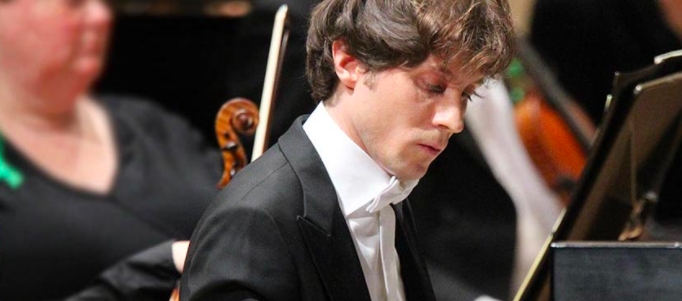Much like being named a Gilmore Artist, winning the International Frederic Chopin International Piano Competition carries much significance for a burgeoning concert pianist. 32-year-old Polish pianist Rafał Blechacz has claimed both accolades. Blechacz swept the Chopin Piano Competition in 2005 — the first Polish pianist in 30 years to win the top prize — and later won the Gilmore Artist Award in 2014.
Blechacz returned to West Michigan last evening for a 2018 Irving S. Gilmore International Keyboard Festival event. He appeared as a guest artist with the Grand Rapids Symphony (GRS), conducted by Music Director Marcelo Lehninger. He and the orchestra performed exquisite works to conjure up a contemplative evening with a hearty dose of thrills.
Blechacz is often recognized as the greatest Chopin interpreter of his generation, and his Deutsche Grammophon recordings of Bach, Debussy and others have received glowing praise.
The GRS audience received a hint of this musical breadth when Blechacz unexpectedly joined the orchestra to perform the program’s first piece.
Written by contemporary American composer Adam Schoenberg, “Canto” is a lovely work. Its distinct American character nods to Aaron Copland and Thomas Newman’s movie scores, but the score molds a warm, comforting space of all its own. The evening’s music started with Blechacz gently strumming the piano strings, a sound that seamlessly melded into a hazy, muted wash of strings followed by woodwinds and brass. Tension created by the opening chords gracefully unfurled into a peaceful soundscape. Strong performances by Principal Trumpet Charley Lea and the woodwind section, as well as thoughtful playing by Blechacz, set a pensive, ethereal tone for the concert.
While Blechacz’s role was minimal in “Canto,” his performance of Chopin’s First Piano Concerto commanded full attention. Chopin was a 19th-century Polish composer with a boundless imagination when it came to creating music for the piano. His notoriously difficult pieces demand a delicate technical touch, while their wistful quality prompts introspection.
Blechacz’s performance offered all of this at a sublime level. Chopin was not a fan of writing symphonic music, so this concerto features light orchestration — potentially exposing every error on behalf of the soloist. This was clearly not a concern for Blechacz. With a refined approach, he let each note and ornament breath with a perfect amount of space. His technical brilliance was spellbinding on its own. But there was also evidence of his deep thoughtfulness (he is currently working toward a doctorate in philosophy, after all). Blechacz responded to the orchestra’s fine accompaniment, and shaped phrases with elegance and even playfulness where it was due.
The GRS orchestra and Lehninger (sans score) performed Antonin Dvorak’s “Symphony No. 8 in G Major” to close the concert. The piece by the 19th-century Czech composer mirrors the idyllic attributes of “Canto,” which is also in the “people’s key” of G major. Dvorak’s symphony also overflows with robust, spirited melodies.
The GRS orchestra took the work at a slower tempo than most recordings; this was more than fair as it was “recovering from a Carnegie hangover” (Lehninger’s words) from its trip to New York City last weekend. The heroic first movement was bolstered by an impeccable woodwind section, and the orchestra had a firm grasp on the second movement’s moody transitions. After a radiant waltz in the third movement, a solid brass fanfare heralded that the end of the piece was near. An athletic flute solo by Principal Flutist Christopher Kantner and hair-rising horn trills ushered in a stirring finale.
Blechacz and the GRS repeat the performance Saturday, April 28 at 8pm at DeVos Performance Hall.
Chopin & Dvorak
DeVos Performance Hall
April 27-28
thegilmore.org





